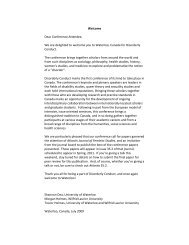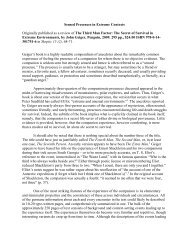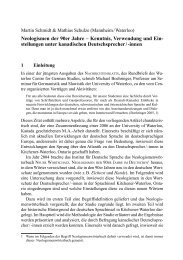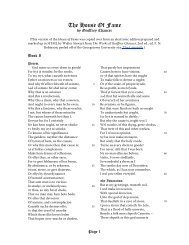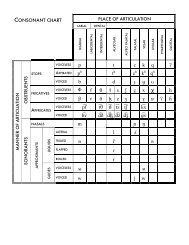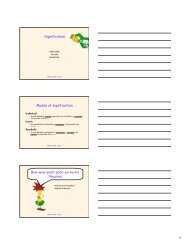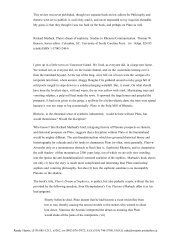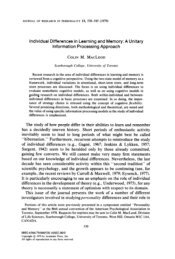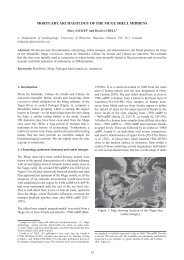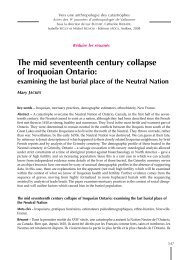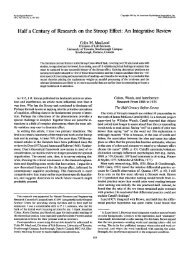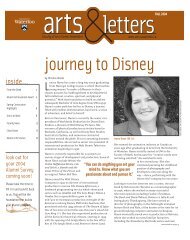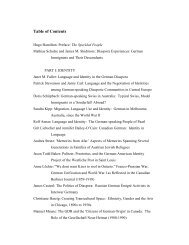Question - Faculty of Arts - University of Waterloo
Question - Faculty of Arts - University of Waterloo
Question - Faculty of Arts - University of Waterloo
You also want an ePaper? Increase the reach of your titles
YUMPU automatically turns print PDFs into web optimized ePapers that Google loves.
Embedding<br />
Information Literacy<br />
in the Virtual Classroom<br />
Laura E. Briggs, Liaison Librarian<br />
James M. Skidmore, Associate Pr<strong>of</strong>essor<br />
The <strong>University</strong> <strong>of</strong> <strong>Waterloo</strong><br />
ACRL/CNI/EDUCAUSE Joint Virtual Conference<br />
20 April 2006
Who Are We?<br />
The Boss Thinks He’s the Boss<br />
2
Tempo – Germany’s premium tissue!<br />
=<br />
Tempo <strong>Question</strong>s<br />
We will use Tempo <strong>Question</strong>s to start short discussions<br />
during the presentation. Selected respondents will<br />
receive free Tempo packs!<br />
3
<strong>Question</strong>: Where Do We Work?<br />
A. <strong>Waterloo</strong>, Belgium<br />
– Where Napoleon summered briefly in<br />
1814?<br />
B. <strong>Waterloo</strong>, Indiana<br />
– Where for every 100 females there are<br />
106.4 males?<br />
C. <strong>Waterloo</strong>, Iowa<br />
– Home <strong>of</strong> the Silos and Smokestacks<br />
National Heritage Area?<br />
D. <strong>Waterloo</strong>, Ontario<br />
– Home <strong>of</strong> the largest Oktoberfest outside<br />
Munich?<br />
4
<strong>University</strong> <strong>of</strong> <strong>Waterloo</strong>: Statistics<br />
Canada’s top-ranked comprehensive<br />
university. (www.macleans.ca/universities/)<br />
Undergraduates 21,029<br />
Graduates 2,359<br />
<strong>Faculty</strong> 895<br />
Staff 2,090<br />
Campus Size 1000 acres<br />
5
Models <strong>of</strong> InfoLit Instruction<br />
Traditional model <strong>of</strong> InfoLit instruction<br />
– Library orientations<br />
– Visiting librarian<br />
– Base level pr<strong>of</strong> / librarian co-operation<br />
Integrated model <strong>of</strong> InfoLit instruction<br />
– Part <strong>of</strong> regular course<br />
– Degrees <strong>of</strong> integration<br />
– Moderate level pr<strong>of</strong> / librarian co-operation<br />
6
New Issues and Implications<br />
Course Management Systems (CMS)<br />
– Technological implications<br />
– Significant pr<strong>of</strong> / librarian co-operation<br />
Task-based learning approach<br />
– Instructional bottleneck<br />
– Design task to meet the need<br />
– Providing feedback is important<br />
– Salter et al, EMI 41 (2004): 207-17.<br />
7
James’ Instructional Bottleneck<br />
“No, Laura, it’s not me!”<br />
Term papers in various GER courses<br />
– Vague - expository instead <strong>of</strong> analytical<br />
– Role <strong>of</strong> information used<br />
• Inappropriate resources<br />
• Lack <strong>of</strong> awareness <strong>of</strong> specialty resources<br />
• Students didn’t see the problem<br />
– Incorrect source citations<br />
8
Students would be able to<br />
James’ Perfect World<br />
– Find quality information sources<br />
– Put those sources to good use<br />
– Transfer acquired skills to other courses or<br />
life in general<br />
So how do I go about getting my way?<br />
9
I shift the burden to Laura!<br />
– But without giving her any lecture time<br />
Our Solution<br />
InfoLit integration through task-based<br />
instruction<br />
– Specific goals for the InfoLit modules<br />
– Tasks as part <strong>of</strong> term project<br />
Targeted solutions to overcome bottlenecks<br />
– Teach relevant information that students will retain<br />
InfoLit delivery via a CMS<br />
– Courses were “going” CMS<br />
(ANGEL Learning – dubbed UW-ACE)<br />
10
Why Use CMS to Deliver InfoLit?<br />
Independent Learning<br />
– Self-study modules work well in CMS<br />
– Lecture time freed up for content<br />
Integration<br />
– Seamless connections between course<br />
and library (especially with e-resources)<br />
– Archive <strong>of</strong> course-relevant material<br />
Involvement prevents marginalization <strong>of</strong><br />
library!<br />
11
Others Are Saying It Too<br />
Cohen, “Course-Management S<strong>of</strong>tware: Where’s the<br />
Library?” EDUCAUSE Review (May/June 2002): 12-13.<br />
Zhang, “Developing Web-Enhanced Learning for<br />
Information Fluency.” Reference & User Services<br />
Quarterly 41 (2002): 356-63.<br />
Martin & Lee, “Using a WebCT to Develop a Research<br />
Skills Module.” Issues in Science and Technology<br />
Librarianship (Spring 2003).<br />
Buehler, “Where is the Library in Course Management<br />
S<strong>of</strong>tware?” Journal <strong>of</strong> Library Administration 41 (2004):<br />
75-84.<br />
George & Martin, “Forging the Library Courseware Link.”<br />
C&RL News 65 (2004): 594-613.<br />
12
<strong>Question</strong><br />
The co-operation outlined in the<br />
preceding slides requires that pr<strong>of</strong>s<br />
and librarians reveal more <strong>of</strong> what they<br />
do to the other party.<br />
How do you feel about increased pr<strong>of</strong> /<br />
librarian interaction?<br />
13
German / Fine <strong>Arts</strong> 359<br />
German Directors in Hollywood<br />
–Mostly 3 rd -year Fine <strong>Arts</strong> students<br />
– 11 students<br />
Instructional Challenges<br />
– Differentiating between film criticism and<br />
film scholarship<br />
– Locating good film scholarship<br />
One <strong>of</strong> the Course Objectives<br />
– To learn more about the sources <strong>of</strong><br />
information that can aid us in the study <strong>of</strong><br />
film.<br />
14
Information<br />
What Did We Do?<br />
– Chart distinguishing film criticism from film<br />
scholarship<br />
– Database orientation<br />
Tasks<br />
– Database quiz<br />
– Integration (<strong>of</strong> database searching) into<br />
term project<br />
15
InfoLit is embedded<br />
in the Term Project.
1. Students<br />
read the<br />
topic.<br />
2. Students read<br />
a sample<br />
database<br />
search (PDF).
3. Students provide<br />
short answers to<br />
questions that<br />
check their ability<br />
to make sense <strong>of</strong><br />
the results <strong>of</strong> the<br />
database search.
Automatic feedback is<br />
brief since individual<br />
feedback was provided<br />
to each student.
Canned searches<br />
We Are Not Alone!<br />
– Students focus on evaluating articles or<br />
learning database mechanics instead <strong>of</strong><br />
constructing search strategies<br />
• Ladner et al, Reference & User Services<br />
Quarterly 43 (2004): 337-45.<br />
•Kearns & Hybl, Science & Technology<br />
Libraries 25 (2005): 39-56.<br />
21
Did Students Engage with the Material?<br />
Yes: material accessed <strong>of</strong>ten<br />
– Main InfoLit resource page very popular<br />
No: only 2 <strong>of</strong> 11 students completed the<br />
online databases quiz<br />
– The quiz had no explicit grade<br />
Does accessing the information mean<br />
that students understood the concepts?<br />
– The take-home final exam would provide<br />
some answers!<br />
22
InfoLit Lurked in the Final Exam
The Students’ Answers<br />
Relied on the databases suggested in the<br />
course<br />
Used simple keyword search strategies:<br />
expressionism AND film<br />
expressionism AND German film<br />
expressionism in film<br />
expressionism<br />
Scholarly article: not all students could<br />
explain why the article they chose was<br />
scholarly<br />
24
<strong>Question</strong><br />
The students’ keyword search<br />
strategies were not very sophisticated.<br />
Did we reap what we sowed by using<br />
canned searches in the InfoLit task for<br />
GER 359?<br />
25
Was James Satisfied?<br />
Is a pr<strong>of</strong> ever really satisfied?<br />
Upcoming <strong>of</strong>fering <strong>of</strong> GER 359<br />
– Comparison <strong>of</strong> film review and film<br />
scholarship will be an integral part <strong>of</strong> term<br />
project<br />
– Completion <strong>of</strong> InfoLit quizzes will have a<br />
direct impact on term project grade<br />
– Final exam component will be kept –<br />
excellent example <strong>of</strong> InfoLit integration<br />
into course content<br />
26
German Thought and Culture<br />
– 271: Beginnings to Mid-1800s<br />
– 272: Mid-1800s to the Present<br />
German 271 / 272<br />
Alternative course for <strong>Faculty</strong> <strong>of</strong> <strong>Arts</strong><br />
language requirement<br />
Second-year students<br />
Mostly non-majors (course is not a<br />
priority for them)<br />
27
Instructional challenge<br />
– Independent background preparation<br />
Task<br />
– Course objective:<br />
GER 271<br />
• To develop independent learning skills by becoming<br />
better able to make use <strong>of</strong> the UW Library's online<br />
reference shelf<br />
– Three birds / one stone<br />
• Basic info about persons / terms<br />
• Identifying suitable resources for tasks<br />
• Matching quantity <strong>of</strong> information to need<br />
28
Key background<br />
information that students<br />
can acquire on their own<br />
Three resources that provide varying<br />
information on the general topic<br />
Fill-in Chart
The Students’ Answers<br />
Made use <strong>of</strong> resources previously<br />
unknown to them<br />
Provided too much information<br />
– Cut-and-paste – didn’t summarize<br />
– Lack confidence to know what information<br />
is important<br />
30
Was James Satisfied?<br />
Again: Is a pr<strong>of</strong> ever really satisfied?<br />
Students saw advantage <strong>of</strong> using UW<br />
Library resources, but thought task was too<br />
long<br />
Future <strong>of</strong>ferings – replace chart with CMS<br />
short answer form<br />
31
Instructional Challenge<br />
– Poor research on term papers<br />
• Avoidance <strong>of</strong> journal articles<br />
• Monographs older or too general<br />
• Inability to cite sources properly<br />
• Lack <strong>of</strong> engagement<br />
– Unfocused, expository essays<br />
GER 272<br />
Task<br />
– InfoLit stated as a course objective<br />
– Term project that introduces students to<br />
journal articles that they use to reflect on<br />
the course content<br />
32
Scaffolded approach<br />
Content<br />
– Index searching (articles)<br />
– MLA citation style<br />
– Abstract writing<br />
Activity Delivery<br />
– Webpages, quizzes, term project task,<br />
final exam<br />
GER 272<br />
33
Course objectives<br />
highlight the<br />
importance <strong>of</strong><br />
InfoLit
Embedded<br />
InfoLit Tasks
Scaffolded InfoLit: Content<br />
1. Students read up on skills needed for<br />
index searching (e.g. the omnipresent<br />
Boolean operators)<br />
36
Scaffolded InfoLit: Testing<br />
2. Students test their index-searching<br />
abilities with a short quiz.<br />
37
Scaffolded InfoLit: Application<br />
3. Students apply what they have<br />
learned to the first stage <strong>of</strong> their<br />
term project.<br />
38
Scaffolded InfoLit: The Whammy!<br />
4. A couple <strong>of</strong> questions from the<br />
multiple choice section <strong>of</strong> the final<br />
exam test basic InfoLit skills.<br />
39
This is a special “Tempo with<br />
Lotion” question!<br />
<strong>Question</strong><br />
The GER 272 final exam had three<br />
basic InfoLit questions.<br />
How well did students do on these<br />
questions? E.g. “83%” (<strong>of</strong> the<br />
responses for all three questions<br />
were correct.)<br />
40
Feedback: Students Saw Value . . .<br />
In acquiring InfoLit skills<br />
– “Really I learned to research subjects a lot more<br />
than I did normally - and saw the value in it! At first<br />
I thought it was difficult and useless, but as I got<br />
better at it, I learned where to find the information I<br />
needed quickly and efficiently.”<br />
– “It’s useful and you can apply it to all your other<br />
courses, too. And now it’s not only easier to find<br />
different articles, but you learn in a way how to<br />
analyze them a little bit better.”<br />
– “Being able to search, find, print and retain a hard<br />
copy <strong>of</strong> an article extends the study experience,<br />
and it also frees up the student to conduct this<br />
means <strong>of</strong> research at almost any time, which is a<br />
great service.”<br />
41
Feedback: Students Saw Value . . .<br />
In task-based learning via CMS<br />
– “Normally, that type <strong>of</strong> thing [MLA Citation Quiz] I<br />
might have skipped over since I would have<br />
assumed that I pretty much knew it, but since I<br />
knew that it was included as part <strong>of</strong> my mark I did<br />
it and then I found that I did learn stuff – who<br />
would have guessed? No, it was really good that it<br />
was online. If I had to go to class for the MLA quiz<br />
then I would think that was ridiculous. Yeah, I<br />
would be, like, I’m not going.”<br />
– “Information Literacy was also helpful. The quiz<br />
and the help with understanding MLA was so<br />
useful. I knew exactly what was expected <strong>of</strong> me in<br />
terms <strong>of</strong> citing sources.”<br />
42
Feedback: Students Saw Value . . .<br />
In the UW Library’s online resources<br />
– “It is typical for a person to go to Google to try to find a<br />
reasonable, fairly reputable website but when you think<br />
about going to the library, it seems like so much work,<br />
but he taught us to use the online journals so it is cool<br />
because one it is online, but two, it is also reputable. It<br />
is a great source <strong>of</strong> information.”<br />
– “I learned that the library has so many resources. It is<br />
actually kind <strong>of</strong> daunting how much information is at our<br />
hands. But that being said, I think the most valuable<br />
thing that I have learned is how to effectively search for<br />
information that would be useful to me.”<br />
– “In all my four years at UW I had never been taught how<br />
to use the online system in the library. I wish I had<br />
learned about this in my first year.”<br />
43
Feedback: Students Saw No Value . . .<br />
In learning InfoLit in GER 272<br />
– “No, I’m a fourth-year student so I have already<br />
had lots <strong>of</strong> practice when it comes to locating<br />
scholarly sources and conducting research.”<br />
– “I had good skills with this before, so this course<br />
did not further those abilities.”<br />
– “The process was rather frustrating. I would prefer<br />
to have the assistance <strong>of</strong> a real librarian.”<br />
– “I do think it is probably easier for students who<br />
are on campus and therefore have access to fleshand-blood<br />
librarian help.”<br />
44
The Future <strong>of</strong> GER 272<br />
Research Study (UW Learning Initiatives<br />
Fund)<br />
– With Pia Marks <strong>of</strong> UW’s LT3 Centre<br />
– Longitudinal study <strong>of</strong> transferable skills<br />
acquisition (cultural interpretation skills<br />
and InfoLit skills)<br />
– In-depth research on student perceptions<br />
in wholly online versus blended learning<br />
environments<br />
45
Final <strong>Question</strong><br />
Our approach has been to use CMS to<br />
embed InfoLit directly into courses.<br />
What do you think about using CMS to<br />
deliver InfoLit as part <strong>of</strong> a course even<br />
if the course does not have a CMS<br />
component?<br />
46
Contact Us<br />
Laura<br />
lbriggs@library.uwaterloo.ca<br />
519 888 4567 x3112<br />
James<br />
skidmore@uwaterloo.ca<br />
519 888 4567 x3687<br />
Who’s who in the pr<strong>of</strong>-librarian relationship?<br />
(Hint: James isn’t holding the club!)<br />
47
<strong>University</strong> <strong>of</strong> <strong>Waterloo</strong><br />
Acknowledgements<br />
– Office <strong>of</strong> the Associate Vice-President,<br />
Learning Resources and Innovation<br />
– The Centre for Learning and Teaching<br />
Through Technology (LT3)<br />
– The <strong>University</strong> <strong>of</strong> <strong>Waterloo</strong> Library<br />
– Department <strong>of</strong> Germanic and Slavic Studies<br />
Almost all photos by James using<br />
Laura’s camera.<br />
48



